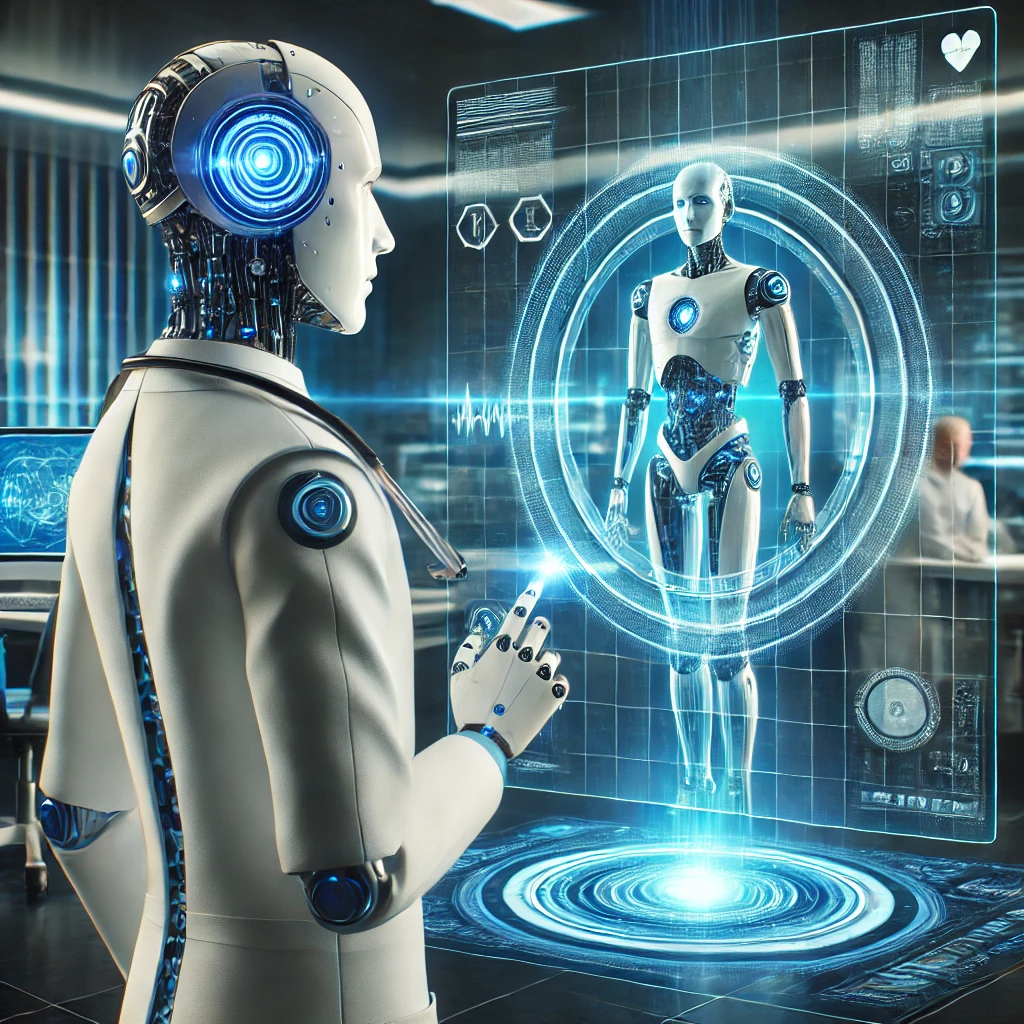[AI in healthcare revolutionizing medical diagnosis, robotic surgery, and drug discovery. Explore how artificial intelligence is shaping the future of medicine in 2025.]
Introduction: The future of AI in Healthcare
Artificial intelligence (AI) is reshaping the healthcare industry in ways never seen before. From AI-Powered diagnostics and robotic surgeries to drug discovery and telemedicine, AI is making healthcare more efficient, accurate, and accessible.
By 2025, the global AI in healthcare market is projected to exceed $100billion, driven by increased adoption of machine learning (ML), deep learning (DL), and natural language processing (NLP) in hospitals, research labs, and pharmaceutical companies.
But how exactly is AI revolutionizing medicine? In this detailed guide we will explore :
✅ The top AI Innovation transforming healthcare.
✅The benefits of AI for doctors, patients, and hospitals.
✅ The challenges and ethical concerns surrounding AI in healthcare.
Let’s dive in…
What is AI in Healthcare ?
AI in healthcare refers to the use of artificial intelligence, machine learning, and deep learning algorithms to process vast amount of data, diagnose diseases, and improves patient outcomes
Key AI Technologies used in Healthcare:
👉 Machine Learning(ML) : Analyzes complex medical data for better diagnosis.
👉 Natural Language Processing (NLP): Converts unstructured medical notes into useful insights.
👉 Computer Vision: Helps AI detects tumours, fractures, and other abnormalities in medical imaging.
👉 Robotic Process Automation (RPA): Automates administrative tasks like patient record management.
Now let’s explore how AI is revolutionizing different areas of healthcare.
5 Ways AI is Transforming Healthcare in 2025
- AI in medical diagnostics 🏥
One of the most impactful AI applications in healthcare is disease diagnosis. AI models are now well capable of detecting cancer, heart disease, and neurological disorders earlier and more accurately than traditional methods.

✅ Example:
Google’s Deepmind AI diagnosed breast cancer with 94.5% accuracy, outperforming human radiologists.
AI tools like PathAI, Qure.ai, and IBM Watson Health are improving radiology, pathology, and cardiology diagnostics.
2. AI-Powered drug discovery 💊
The pharmaceutical industry is leveraging AI to speed up drug discovery and reduce costs. AI algorithms analyzes millions of chemical compounds to identify potential drug candidates faster than traditional research.
✅ Example
Insilico medicine’s AI system developed a new drug for liver cancer in just 30 days- a process that usually takes years.
AI models help pharmaceutical companies like Pfizer, Novartis, and AstraZeneca conduct faster clinical trials.
3. AI in Surgery and Robotics
AI-Powered robotic surgeons are improving surgical precisions, reducing errors, and shortening recovery times. AI-assisted robotic surgery is expected to grow into $15 million market by 2026.
✅ Example
The da Vinci surgical system uses AI and robotics to assist human surgeons in complex procedures.
AI-Powered robots like Mazor X and CorPath GRX help with spinal and cardiovascular surgeries.
4. AI in personalized Medicines 🧬
AI is helping doctors create customised treatment plans based on patient’s genetics, lifestyle, and medical history.
✅ Example
IBM Watson Health predicts how cancer patients will respond to different treatments.
AI-Powered genomic analysis is helping doctors tailor treatments for diseases like diabetes and Alzheimer’s.
5. AI in Telemedicine and Virtual Healthcare 📱
Telemedicine is growing rapidly, thanks to AI chatbots, virtual doctors and remote monitoring. AI is making healthcare more accessible and affordable, especially in remote areas.
✅ Example
AI chatbots like Ada Health and Babylon Health provide 24/7 medical consultations.
Wearable AI devices (like Apple Watch and Fitbit ) detects heart irregularities monitor vitals in real time.
Ethical and Regulatory challenges of AI in Healthcare
🚨 Data Privacy and Security Risks – All stores and processes massive amounts of sensitive patient’s data raising cybersecurity concerns.
🚨 AI Bias & Misdiagnosis – If AI is trained on biased datasets, it can lead to inaccurate diagnosis for certain demographics.
🚨 Job Displacement – AI automation may reduce demand for certain healthcare jobs.
Regulatory bodies like the FDA and WHO are working on setting guidelines to ensure AI is safe, fair, and effective in healthcare.
🔮 The Future of AI in Healthcare: What’s Next?
Experts predict that by 2030, AI will:
✅ Enable fully AI-assisted hospitals with real-time patient monitoring
✅ Develop AI-powered robotic nurses for patient care
✅ Use brain-computer interfaces (BCIs) to restore movement in paralyzed patients
AI is not replacing doctors, but rather enhancing medical decision-making. The future of AI in healthcare is bright, with faster diagnostics, better treatments, and more personalized patient care.
📢 Conclusion: The Role of AI in Medicine
AI is revolutionizing healthcare in 2025—from early disease detection to robotic surgeries and drug discovery. However, challenges like AI bias, data security, and ethical concerns must be addressed for AI to reach its full potential.
💬 What do you think about AI in healthcare? Will AI replace doctors or assist them? Drop your thoughts in the comments!
📢 Found this article helpful? Share it with your network!

